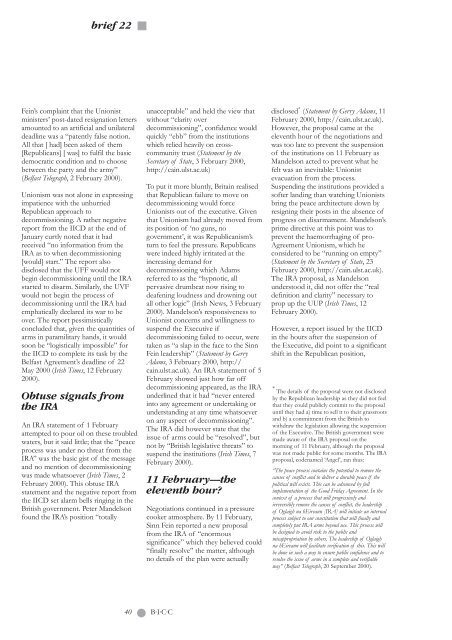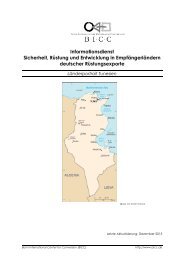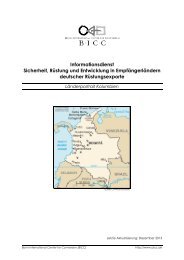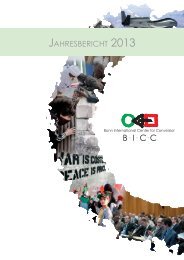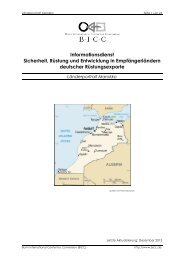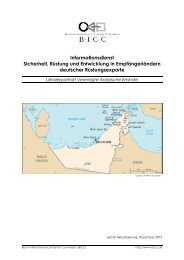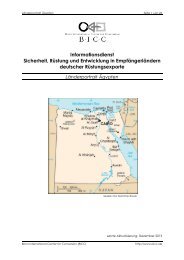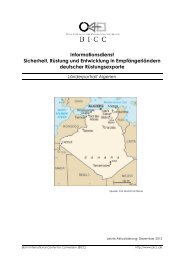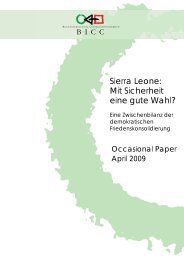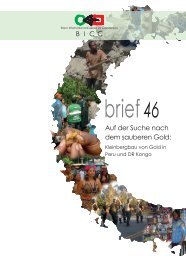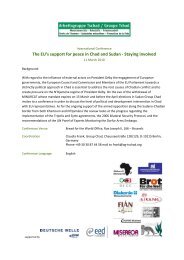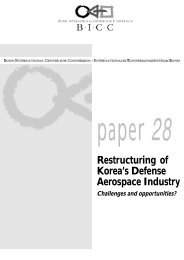English - BICC
English - BICC
English - BICC
You also want an ePaper? Increase the reach of your titles
YUMPU automatically turns print PDFs into web optimized ePapers that Google loves.
ief 22<br />
Fein’s complaint that the Unionist<br />
ministers’ post-dated resignation letters<br />
amounted to an artificial and unilateral<br />
deadline was a “patently false notion.<br />
All that [ had] been asked of them<br />
[Republicans] [ was] to fulfil the basic<br />
democratic condition and to choose<br />
between the party and the army”<br />
(Belfast Telegraph, 2 February 2000).<br />
Unionism was not alone in expressing<br />
impatience with the unhurried<br />
Republican approach to<br />
decommissioning. A rather negative<br />
report from the IICD at the end of<br />
January curtly noted that it had<br />
received “no information from the<br />
IRA as to when decommissioning<br />
[would] start.” The report also<br />
disclosed that the UFF would not<br />
begin decommissioning until the IRA<br />
started to disarm. Similarly, the UVF<br />
would not begin the process of<br />
decommissioning until the IRA had<br />
emphatically declared its war to be<br />
over. The report pessimistically<br />
concluded that, given the quantities of<br />
arms in paramilitary hands, it would<br />
soon be “logistically impossible” for<br />
the IICD to complete its task by the<br />
Belfast Agreement’s deadline of 22<br />
May 2000 (Irish Times, 12 February<br />
2000).<br />
Obtuse signals from<br />
the IRA<br />
An IRA statement of 1 February<br />
attempted to pour oil on these troubled<br />
waters, but it said little; that the “peace<br />
process was under no threat from the<br />
IRA” was the basic gist of the message<br />
and no mention of decommissioning<br />
was made whatsoever (Irish Times, 2<br />
February 2000). This obtuse IRA<br />
statement and the negative report from<br />
the IICD set alarm bells ringing in the<br />
British government. Peter Mandelson<br />
found the IRA’s position “totally<br />
unacceptable” and held the view that<br />
without “clarity over<br />
decommissioning”, confidence would<br />
quickly “ebb” from the institutions<br />
which relied heavily on crosscommunity<br />
trust (Statement by the<br />
Secretary of State, 3 February 2000,<br />
http://cain.ulst.ac.uk)<br />
To put it more bluntly, Britain realised<br />
that Republican failure to move on<br />
decommissioning would force<br />
Unionists out of the executive. Given<br />
that Unionism had already moved from<br />
its position of ‘no guns, no<br />
government’, it was Republicanism’s<br />
turn to feel the pressure. Republicans<br />
were indeed highly irritated at the<br />
increasing demand for<br />
decommissioning which Adams<br />
referred to as the “hypnotic, all<br />
pervasive drumbeat now rising to<br />
deafening loudness and drowning out<br />
all other logic” (Irish News, 3 February<br />
2000). Mandelson’s responsiveness to<br />
Unionist concerns and willingness to<br />
suspend the Executive if<br />
decommissioning failed to occur, were<br />
taken as “a slap in the face to the Sinn<br />
Fein leadership” (Statement by Gerry<br />
Adams, 3 February 2000, http://<br />
cain.ulst.ac.uk). An IRA statement of 5<br />
February showed just how far off<br />
decommissioning appeared, as the IRA<br />
underlined that it had “never entered<br />
into any agreement or undertaking or<br />
understanding at any time whatsoever<br />
on any aspect of decommissioning”.<br />
The IRA did however state that the<br />
issue of arms could be “resolved”, but<br />
not by “British legislative threats” to<br />
suspend the institutions (Irish Times, 7<br />
February 2000).<br />
11 February—the<br />
eleventh hour?<br />
Negotiations continued in a pressure<br />
cooker atmosphere. By 11 February,<br />
Sinn Fein reported a new proposal<br />
from the IRA of “enormous<br />
significance” which they believed could<br />
“finally resolve” the matter, although<br />
no details of the plan were actually<br />
40 B·I·C·C<br />
disclosed * (Statement by Gerry Adams, 11<br />
February 2000, http://cain.ulst.ac.uk).<br />
However, the proposal came at the<br />
eleventh hour of the negotiations and<br />
was too late to prevent the suspension<br />
of the institutions on 11 February as<br />
Mandelson acted to prevent what he<br />
felt was an inevitable: Unionist<br />
evacuation from the process.<br />
Suspending the institutions provided a<br />
softer landing than watching Unionists<br />
bring the peace architecture down by<br />
resigning their posts in the absence of<br />
progress on disarmament. Mandelson’s<br />
prime directive at this point was to<br />
prevent the haemorrhaging of pro-<br />
Agreement Unionism, which he<br />
considered to be “running on empty”<br />
(Statement by the Secretary of State, 23<br />
February 2000, http://cain.ulst.ac.uk).<br />
The IRA proposal, as Mandelson<br />
understood it, did not offer the “real<br />
definition and clarity” necessary to<br />
prop up the UUP (Irish Times, 12<br />
February 2000).<br />
However, a report issued by the IICD<br />
in the hours after the suspension of<br />
the Executive, did point to a significant<br />
shift in the Republican position,<br />
*<br />
The details of the proposal were not disclosed<br />
by the Republican leadership as they did not feel<br />
that they could publicly commit to the proposal<br />
until they had a) time to sell it to their grassroots<br />
and b) a commitment from the British to<br />
withdraw the legislation allowing the suspension<br />
of the Executive. The British government were<br />
made aware of the IRA proposal on the<br />
morning of 11 February, although the proposal<br />
was not made public for some months. The IRA<br />
proposal, codenamed ‘Angel’, ran thus:<br />
“The peace process contains the potential to remove the<br />
causes of conflict and to deliver a durable peace if the<br />
political will exists. This can be advanced by full<br />
implementation of the Good Friday Agreement. In the<br />
context of a process that will progressively and<br />
irreversibly remove the causes of conflict, the leadership<br />
of Oglaigh na hEireann [IRA] will initiate an internal<br />
process subject to our constitution that will finally and<br />
completely put IRA arms beyond use. This process will<br />
be designed to avoid risk to the public and<br />
misappropriation by others. The leadership of Oglaigh<br />
na hEireann will facilitate verification of this. This will<br />
be done in such a way to ensure public confidence and to<br />
resolve the issue of arms in a complete and verifiable<br />
way” (Belfast Telegraph, 20 September 2000).


